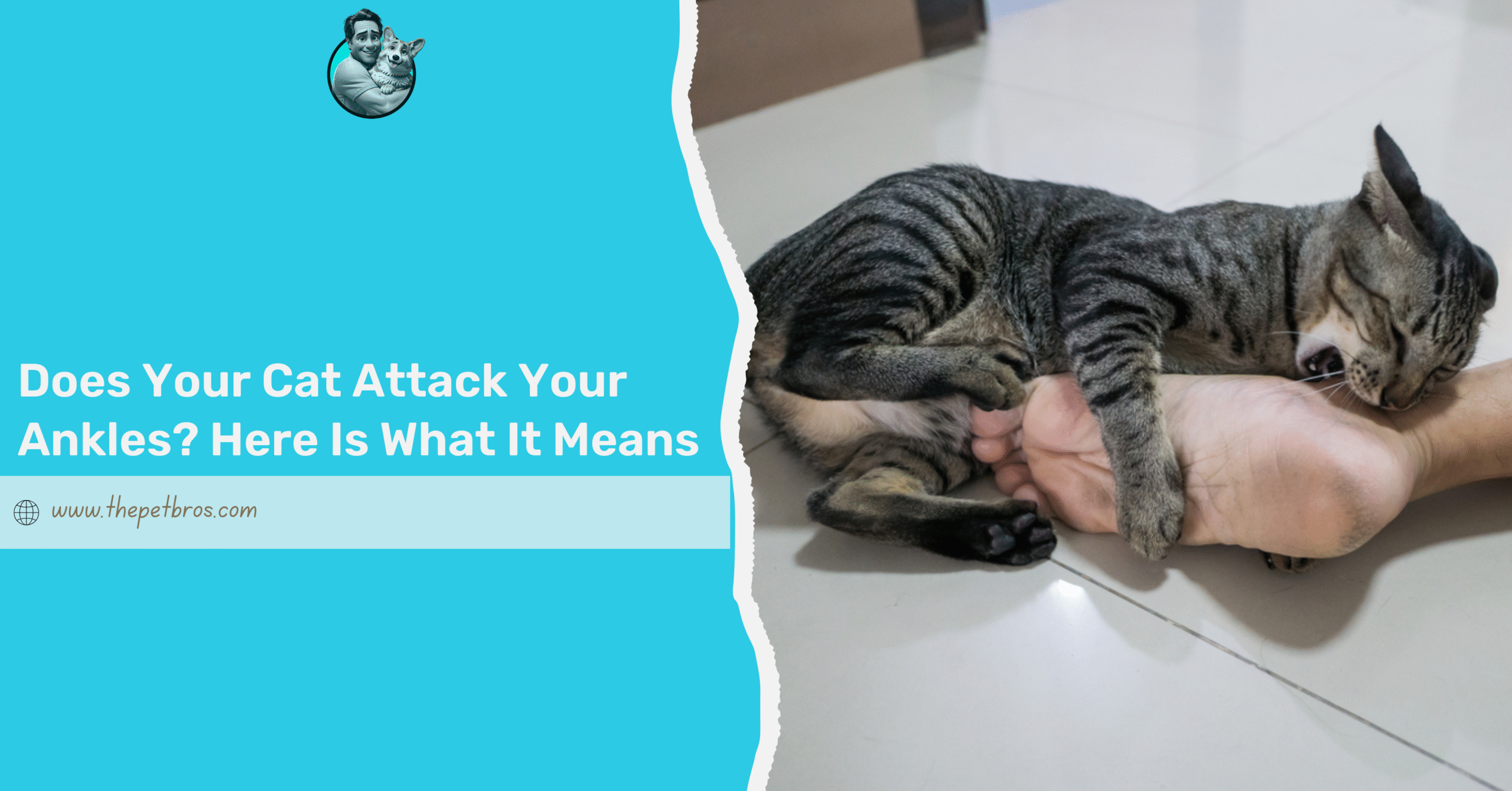Does your cat attack your ankles? If yes, then you’re not alone. Many cat owners have been ambushed by their cats as they stroll through the house, only to be met with an unexpected bite or scratch to their ankles. It’s like the sudden ambush you usually never saw coming. One minute, you’re walking calmly through the house, and the next, your cat’s claws are wrapped around your ankles as if they’ve been planning the attack all along.
Before you start thinking your cat is out to get you, rest assured, this behaviour is more common than you might think. It’s not a random act of mischief; there are several reasons behind those surprise ankle attacks.
In this article, we’ll explore why your cat attacks your ankles and, more importantly, how to stop the behaviour. Ready to take back control of your legs? Let’s get to it.
5 Reasons Your Cat Attack Your Ankles
There’s always a reason for this quirky behaviour, sometimes it’s instinct, other times it’s boredom, every now and then, it’s your cat’s way of trying to get your attention. Whatever the cause, understanding those ankle attacks is the first step to putting a stop to them. Here are the most common explanations.
1. Playful Aggression
Cats have natural hunting instincts, and your moving ankles might be seen as prey when they are playing. At the heart of most ankle attacks is playful aggression. Your cat mixes playing and hunting; those surprise pounces on your ankles are not acts of malice.
Wild cats rely on their hunting skills for survival; no wonder your cosy house cat still has that urge tucked away inside. When your cat hides and leaps at your feet, it’s acting out the same patterns they would use to catch prey. The movement of your ankles as you walk is simply irresistible; a moving target that’s far too tempting to ignore.
If you’ve been paying attention to your cat all along, you would have noticed that this behaviour starts when cats are young. As kittens, they practice hunting through play, pouncing on littermates, toys, or anything that moves.
Sometimes, this habit persists into adulthood. When you see your cat chasing and biting your ankles but quickly relaxes and even tries to play more, you’re seeing classic play aggression, not a sign that your cat is genuinely angry or aggressive.
2. Boredom and Lack of Stimulation
A bored cat is a creative cat, and that’s not always in ways you’d hope. When there isn’t enough to capture their attention, your legs become a moving form of entertainment. Cats are natural hunters and problem-solvers. So when you leave them without enough toys, games, or challenges, they’ll find their own ways to stay busy. Unfortunately, a pair of ankles walking past is just the right size and speed for a spontaneous pounce.
If you also do not provide regular play sessions, scratching posts, or puzzle toys for your cats, believe me, that energy is not going to waste; instead, it is building up. When there’s nowhere for it to go, that pent-up energy gets channelled into whatever catches their eye. And yes, it is often your feet.
3. Your Cat Wants Attention
Sometimes, those ankle ambushes are less about hunting and more about attention. Cats quickly learn that specific actions elicit a reaction; for example, they notice your response to their startled jump, playful chase, or the way you look down and talk to them.
So, if your cat feels ignored or craves interaction, they know that targeting your ankles is a surefire way to break the silence. They might even give you a bite or a swipe at your ankles. They are just taking the quickest road to getting you to notice them, especially if you’ve been busy or distracted.
Your cat may be signalling that it’s time to play, time for food, or simply time to focus on them for a moment. Over time, if ankle attacks get a big response, your cat might repeat the behaviour because they know it works. It’s less about mischief and more about making sure their needs are heard.
4. Stress or Anxiety
Life changes can rattle even the happiest cat. If you’ve noticed more ankle attacks after a significant change, like moving to a new house, bringing home a new pet, or something as minor as switching up the furniture, then stress could be the culprit.
Just like other pets, such as dogs and birds, cats are creatures of habit, and disruptions to their environment or routine can leave them feeling unsettled. When cats experience stress or anxiety, they often seek outlets to release their pent-up energy.
This is where your ankle comes in. Pouncing on your ankles might be their way of coping, burning off nerves, or reasserting some sense of control. In these moments, your moving feet are both a target and a distraction from whatever’s making your cat uneasy. Spotting this pattern can help you identify what’s happening beneath the surface.
5. Teething in Kittens
If you share your home with a kitten, those tiny teeth might explain their obsession with ankles. Kittens go through a teething phase, and during this phase, biting and chewing help relieve the discomfort of new teeth coming in. Your moving ankles, which are easily within their reach, can become their teething toy.
In this stage, you’ll notice your kittens constantly looking for things to gnaw on, anything at all, including furniture legs, your shoelaces or your shoes themselves. If you happen to be walking by, your ankles become the target of choice. The good news? This behaviour usually fades as kittens grow and their adult teeth settle in. Until then, those ankle attacks are just another part of growing up for your little feline.
How to Stop Your Cat From Attacking Your Ankles
Taking back control of your ankles starts with a little creativity and a lot of patience. One of the most effective strategies is to keep your cat entertained. Offer plenty of interactive toys and schedule regular play sessions to burn off their extra energy in a positive way. Wand toys, laser pointers, and puzzle feeders can give your cat the stimulation they crave and distract them from your feet.
Also, don’t forget to establish a routine that includes playtime and activities your cat enjoys. The more outlets they have for their natural hunting instincts, the less likely they are to see your ankles as fair game.
If you spot your cat gearing up for an attack, redirect their attention to a favourite toy before they pounce. Rewarding your cat with treats or affection when they choose toys over ankles can help you reinforce the right behaviour, making it more likely they’ll repeat it.
Remember, patience and consistency are key. It will take time, but with the right toys and plenty of encouragement, your cat can learn new ways to play that don’t involve your ankles.
What You Must Not Do
It’s easy to react sharply when your cat attacks your ankles, but punishment is not the answer. Swatting, shouting, or any form of harsh discipline can actually exacerbate the situation. Instead of a bored cat, you might find yourself trying to deal with a stressed and confused cat.
Rather than learning from their mistake, your cat may simply become anxious or wary around you, which can lead to more unwanted behaviour. Avoid using your hands or feet as toys, as this will only encourage rough play and blur the line between what is acceptable and what is not.
Conclusion
Ankle attacks might feel personal at first, but they’re just your cat’s way of expressing natural instincts, burning off energy, or getting your attention. The first step is to understand the reasons behind this quirky behaviour. Your next step is creating a happier home for both you and your feline friend. Don’t worry, just a bit of patience, the right toys, and a consistent routine, you can help your cat find better ways to play, leaving your ankles in peace.
Frequently Asked Questions
How do I stop my cat from attacking my ankles?
Use interactive toys, regular playtime, and redirection to prevent ankle attacks.
Can teething cause ankle-biting in kittens?
Yes, kittens may bite your ankles while teething, but this behaviour typically stops once they mature.
What’s the best way to stop my cat from using my feet as prey?
Never use your feet or hands as toys. Redirect your cat to appropriate toys that mimic hunting behaviour.
Is ankle-biting a sign that my cat is aggressive?
No, it’s generally a form of play, aggression, or attention-seeking behaviour.














